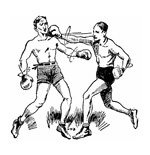
On Getting Punched in the Face
TURN THE OTHER CHEEK?
Recently I got punched in the face by a youngster with a disability. Stephanie had had her fill of a group therapy session, especially in her fractious relationship with another young woman. The fist that hit my face wasn’t intended for me at all. I was in the middle of a vicious shouting match, getting one young girl to sit down and cool her heels, while her sparring partner was being cooled down by her friends. Suddenly, an unexpected head came out of the left side of the room, and a young boy who wanted to see the fight continue and build in its fury charged me, knocking me surprised and breathless to the ground, allowing these two young women to begin hitting one another again. Standing up, I was then hit in the face with my glasses on, not once but twice, and soon I was lost in the chaotic tussle of young people trying to stop the fight. In the next minute, as I held my face, I soon found that I was part of a flow of youngsters pushing the one girl down to the floor. In one swift motion, the staff forcefully pinned the other girl down to the floor. Once the room was vacated, I picked up my glasses, only to find them all bent out of shape, looking Picasso-esque. My forehead had a bright red mark where the punch landed; I was anxious and a bit frayed around the edges.
Following the fight, I went to debrief with the rest of the staff involved in the confrontation. Even though I have had the required classes on “therapeutic holding” for controlling physical confrontations, I chose not to use the techniques because of the subtle violence hidden under the rubric of “safety.” The staff unanimously declared that I had done nothing, that I had been foolish. My response was that I had done something: I had talked to the young women and refused to be intimidated by their verbal threats against me and each other. I had responded with nonviolence, which can make all the difference in the world. Why not put the words of Jesus into practice? I had simply turned the other cheek to the ugly, raging violence of the group. No one was satisfied with the answer.
Things did not calm down that much for Stephanie during the day. When I checked in with her toward evening, I asked if she had some time to talk with me. We went to a quiet room. When I closed the door to the room, she let forth with a fiery verbal assault, exposing how lonely and vulnerable she felt, stressing that there was no support for her in her isolation. Known for exaggerating, Stephanie spewed forth her anger, spitting out her words like a blast of singeing fire. I said nothing, alternately looking at her and glancing to the floor, hoping she would get it out of her system. “You don’t care for me when you leave this place. God doesn’t care for me or He would have rescued me by now from this hellish place; Jesus doesn’t care about me either. No one cares about me in this place,” she said angrily. This was followed by a great burst of tears and uncontrollable sobbing, to be softened by the only equipment I had: a box of tissues. Sitting calmly, struggling to be with her in her hurt, and not saying a word were enough to vanquish the dragon within Stephanie. We were reconciled.
You May Also Enjoy
I was 21 years old in 1972. By that time, a year before Roe v.…
The Prophetic Poet and the Spirit of the Age. Vol. I: Why Flannery O’Connor Stayed Home. Vol. II: Why Poe Drank Liquor. Vol. III: Why Hawthorne Was Melancholy... Miracles and the Critical Mind
A new secularism, what might be called “postmodernist secularism,” has become a defining characteristic of…

